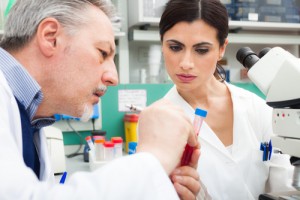 Cancer is one of the most deadly diseases in the world, with a mortality of 8.2 million people in 2012, as reported by the World Health Organization (WHO). A recent WHO report predicts that the worldwide number of cancer cases diagnosed per year will increase from 14 to 22 million between 2012 and 2032.
Cancer is one of the most deadly diseases in the world, with a mortality of 8.2 million people in 2012, as reported by the World Health Organization (WHO). A recent WHO report predicts that the worldwide number of cancer cases diagnosed per year will increase from 14 to 22 million between 2012 and 2032.
Prostate cancer (PCa) is one of the most common cancers among men in Western developed countries, including the United States, which has among the higher rates of cases diagnosed per year in the world. In the U.S. in 2013, diagnosed prostate cancer contributed to approximately 239,000 cases, among which, 30,000 men were expected to die due to the disease, as reported by the American Cancer Society. While prostate cancer is not the most deadly type of cancer, it has a significant negative impact on the male population.
The prevalence of the prostate cancer within the U.S. states it’s not homogeneous, there are five states with the highest incidence: Louisiana (161.1 incidences per 100,000 men); New Jersey (155.8); Michigan (156.4); Utah (154.4), and New York (154) according with the Centers for Disease Control and Prevention (CDC). While on the national base, the rate of prostate cancer is significantly lower — 128.3 incidences per 100,000 men. Still, there is no scientific answer for this unusually high incidence of prostate cancer cases in these five U.S. states, however, research studies have put forward a series of risk factors that can increase the susceptibility for this type of cancer, including patient’s family history and genetics, smoking habits, obesity and age. Even though prostate cancer is a serious health concern for the male population, more information about those risk factors as well as an increase in the research and development of therapeutic products are improving survival and quality of life of the patients. This encouraging progress is supported by the five-year survival data on prostate cancer from the American Cancer Society that shows an improvement, from 68% to almost 100%, respectively, between 1975-1977 and 2002-2008, depending on stage of diagnosis of the prostate cancer.
The research and development of therapeutic products to treat prostate cancer has been focused mainly in therapies for advanced stages of the disease while for the early stages the approach has been a watch-and-wait strategy or hormone therapy to decrease tumor growth. Biopharmaceutical companies Medivation and Astellas Pharma‘s have developed the drug Xtandi, for which the Food and Drug Administration (FDA) in 2012 anticipated its approval in three months, mainly because of the high efficacy of the drug in significantly improving the median overall survival from 4.8 to 18.4 months. Importantly, in September, a label expansion designation was attributed to Xtandi, due to the PREVAIL study, for the treatment of metastatic castration-resistant prostate cancer in a situation of pre-chemotherapy. In this study the overall survival increased 29% on the treated-patients when compared to the placebo group, while radiographic progression-free survival, the amount of time during and after treatment in which a tumor does not grow, improved 81%. Therefore, this drug seems very promising since in the market there are very few drugs to treat advanced-stage prostate cancer. Additionally, Johnson & Johnson‘s developed Zytiga, a crucial drug that was approved in both pre-chemo and post-chemotherapy situations and was shown to improve in five months the median overall survival of the treated-patients when compared to the placebo group.
Overall, it seems that many promising novel therapies have been released to the market since 2011, although the future of cancer, especially prostate cancer treatment, may rely on immunotherapy — therapies which are under early development and function by putting our own immune cells to work in recognizing and acting against tumors to slow or stop tumor proliferation.
There is a promising experimental immunotherapy being developed by NewLink Genetics‘ that is in phase 1 study in HyperAcute Prostate patients. This therapy consists of isolating between 30 and 500 million prostate cancer cells from patients, and genetically manipulating these cells in order to express alpha-gal carbohydrates, the anti-Gal antibody is the most abundant natural antibody expressed by humans. These genetically manipulated prostate cancer cells when administered to the patient will stimulate an immune response that will target the prostate cancer cells and expectantly will stop the proliferating tumor. Unfortunately, this therapy is still in a very early stage of testing, therefore its potential therapeutic use is still being analyzed. Even if successful, the release to the market will take some years.
While the results on the treatment of late-stage prostate cancer cases are still not very encouraging, there has been over the last forty years a significant improvement in survival and quality of life of the patients, when compared to other types of cancer, however the research on cancer has still a long way to go. Hopefully, within ten years we will have survival rate near 100% and will make significant breakthroughs to increase the survival and quality of life for patients with advanced prostate cancer.

